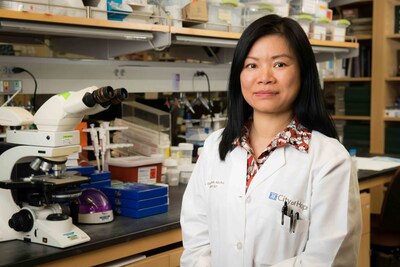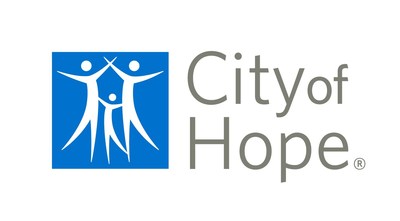|
05.01.2023 19:18:00
|
City of Hope-led trial leads to U.S. Food and Drug Administration's approval of a first of its kind bispecific antibody
Mosunetuzumab treats people with relapsed or refractory follicular lymphoma, the most common slow-growing form of non-Hodgkin's lymphoma
LOS ANGELES, Jan. 5, 2023 /PRNewswire/ -- A trial led by City of Hope, one of the largest cancer research and treatment organizations in the nation, contributed to the U.S. Food and Drug Administration's approval of mosunetuzumab (commercial name: Lunsumio), the first bispecific antibody to treat people with relapsed or difficult to treat follicular lymphoma (FL), a type of non-Hodgkin lymphoma, after they have received two or more standard therapies.
A trial led by City of Hope contributed to FDA's approval of mosunetuzumab, the first bispecific antibody for lymphoma,Mosunetuzumab is a CD20xCD3 T cell engaging bispecific antibody and represents a new class of fixed-duration cancer immunotherapy, which is off-the-shelf and readily available for infusion, allowing patients to start treatment soon after diagnosis in an outpatient setting.
Instead of concentrating on a singular target, bispecific antibodies are therapeutics that act on two cellular targets simultaneously. In the case of mosunetuzumab, one "arm" targets the CD3 protein on T cells, an immune cell that fights against cancer once engaged; a second "arm" binds to CD20, a protein commonly found on lymphoma cells.
"This approval is a significant milestone for people with relapsed or refractory follicular lymphoma and signifies the beginning of a new treatment modality for lymphoma since mosunetuzumab is the first bispecific antibody approved for lymphoma," said Elizabeth Budde, M.D., Ph.D., hematologic oncologist and associate professor, City of Hope Division of Lymphoma, Department of Hematology & Hematopoietic Cell Transplantation, and the mosunetuzumab pivotal trial principal investigator. "At City of Hope, the integration of scientific research and clinical trials allows us to deliver groundbreaking science and treatments from laboratory to patient. Mosunetuzumab is a first in class T cell engaging bispecific antibody and could change the way advanced follicular lymphoma is treated."
Budde led a multicenter Phase 2 study in people with heavily pretreated FL, including those who were at high risk of disease progression or whose disease didn't respond to prior therapies. Results from the study showed high and durable response rates and an impressive benefit-risk profile.
An overall response rate, which is the combination of a complete response rate, or the disappearance of all signs and symptoms of cancer, and a partial response rate was seen in 80% of patients treated with mosunetuzumab, with a majority maintaining responses after 24 months. The median duration of response among those who responded was not reached. A complete response rate was achieved in 60% of patients.
The most common side effects were cytokine release syndrome, which occurred in 44% of patients. Other common side effects included fatigue, rash, pyrexia and headache.
"The two cell groups are pulled together, with mosunetuzumab serving as a kind of bridge," Budde said. "Being in such close proximity allows the now activated T cells to better recognize and attack the lymphoma cells."
Ninety patients with follicular lymphoma, who ranged in age from 29 to 90 years old, were enrolled in the multicenter international trial. The patients received mosunetuzumab, a Genentech medicine, intravenously every 21 days for a minimum of eight cycles and up to 17 cycles.
Juan Yee, 49, of San Diego was one of the patients in the City of Hope trial whose lymphoma had relapsed for a second time.
"I couldn't go through chemo again," said Yee. He was first diagnosed in 2012 with FL and relapsed in 2016. He experienced weight loss, easy fatigue and persistent night sweats. "It was painful, and I was tired. I was done."
But thanks to one last try with mosunetuzumab, Yee has been in complete remission for nearly five years now.
"When I was going through treatments, I would ask God why this was happening to me," Yee said. "And now I think it's so that I could do this (mosunetuzumab) trial and help other people. I can share my positive experience and let people know they shouldn't give up. Have faith."
Follicular lymphoma is the most common slow-growing form of non-Hodgkin's lymphoma, accounting for about 1 in 5 cases. It typically responds well to treatment, but is often characterized by periods of remission and relapse. The disease typically becomes harder to treat each time a patient relapses, and early progression can be associated with poor long-term prognosis. It is estimated that, in the United States, approximately 13,000 new cases of FL will be diagnosed in 2022, and more than 100,000 people are diagnosed with FL each year worldwide.
City of Hope is a leader in blood cancer immunotherapies. The National Cancer Institute-designated comprehensive cancer center has performed more than 18,000 bone marrow/stem cell transplants and is a leader in chimeric antigen receptor (CAR) T therapy, with more than 1,000 patients treated with immune effector cells, including CAR T therapy, and more than 70 open trials.
Budde is an advisory board member with Genentech, a member of the Roche Group.
About City of HopeCity of Hope's mission is to deliver the cures of tomorrow to the people who need them today. Founded in 1913, City of Hope has grown into one of the largest cancer research and treatment organizations in the U.S. and one of the leading research centers for diabetes and other life-threatening illnesses. As an independent, National Cancer Institute-designated comprehensive cancer center, City of Hope brings a uniquely integrated model to patients, spanning cancer care, research and development, academics and training, and innovation initiatives. Research and technology developed at City of Hope has been the basis for numerous breakthrough cancer medicines, as well as human synthetic insulin and monoclonal antibodies. A leader in bone marrow transplantation and immunotherapy, such as CAR T cell therapy, City of Hope's personalized treatment protocols help advance cancer care throughout the world.
With a goal of expanding access to the latest discoveries and leading-edge care to more patients, families and communities, City of Hope's growing national system includes its main Los Angeles campus, a network of clinical care locations across Southern California, a new cancer center in Orange County, California, and Cancer Treatment Centers of America. City of Hope's affiliated family of organizations includes Translational Genomics Research Institute and AccessHope™. For more information about City of Hope, follow us on Facebook, Twitter, YouTube, Instagram and LinkedIn.
![]() View original content to download multimedia:https://www.prnewswire.com/news-releases/city-of-hope-led-trial-leads-to-us-food-and-drug-administrations-approval-of-a-first-of-its-kind-bispecific-antibody-301714866.html
View original content to download multimedia:https://www.prnewswire.com/news-releases/city-of-hope-led-trial-leads-to-us-food-and-drug-administrations-approval-of-a-first-of-its-kind-bispecific-antibody-301714866.html
SOURCE City of Hope
 Der finanzen.at Ratgeber für Aktien!
Der finanzen.at Ratgeber für Aktien!
Wenn Sie mehr über das Thema Aktien erfahren wollen, finden Sie in unserem Ratgeber viele interessante Artikel dazu!
Jetzt informieren!

